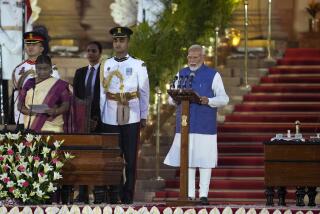Nepal chooses a new prime minister
- Share via
Reporting from Katmandu and New Delhi — After 17 attempts, steadily diminishing expectations and paralysis in local government as budgets and appointments were delayed, Nepal late Thursday named a new prime minister.
As fellow lawmakers cheered, the speaker of the assembly announced that Jhalnath Khanal, leader of the Communist Party of Nepal (United Marxist-Leninist), had secured 368 of 601 parliamentary votes.
The Communist Party is Nepal’s third-largest after the Maoists and the Nepali Congress. But Maoist Chairman Pushpa Kamal Dahal withdrew his party candidacy and agreed to back Khanal, ending a six-month logjam that followed the resignation of the government in June. A number of attempts to name a prime minister all failed.
Khanal, 60, was involved in pro-democracy protests against the monarchy in 1990 and 2006, and this will be his first tenure as prime minister.
A key challenge ahead will be easing back into society thousands of former Maoist fighters who waged an armed struggle against the government from 1995 to 2005 before agreeing to join the political process.
Katmandu-based political analyst Yubaraj Ghimire said the breakthrough reflects a partnership of far-left parties. He said he expected wrangling ahead over Cabinet posts.
But, Ghimire added, Khanal also has an opportunity to move the country forward, if he can energize the nascent peace process and help Nepal craft a constitution.
In recent days, there has been a flurry of diplomatic activity between India and Nepal with Indian Foreign Secretary Nirupama Rao having recently visited Katmandu and Nepalese President Ram Baran Yadav near the end of a 10-day trip to India.
India, the regional power, had opposed a Nepalese government led by the Maoists, concerned that this could increase regional instability, said Sankarshan Thakur, with India’s Telegraph newspaper.
But Thursday’s developments suggest New Delhi helped broker a compromise. “It may be a workable solution,” he added.
Citizens expressed wary optimism. “I don’t think it matters that much who becomes prime minister,” said Govinda Dotel, 26, a Katmandu resident. “But I hope things improve for Nepal.”
The long-awaited deal should pave the way for basic government services to resume as police and district officers are appointed, but progress could be slow.
“Nepal, like India, is a chronically ill-governed state,” Thakur said. “The good part is, the country goes on irrespective of whether there’s a government or not. This will help. But I’m not sure it will lead to an efficient state overnight.”
Special correspondent Bhandari reported from Katmandu and Times staff writer Magnier from New Delhi.
More to Read
Sign up for Essential California
The most important California stories and recommendations in your inbox every morning.
You may occasionally receive promotional content from the Los Angeles Times.













